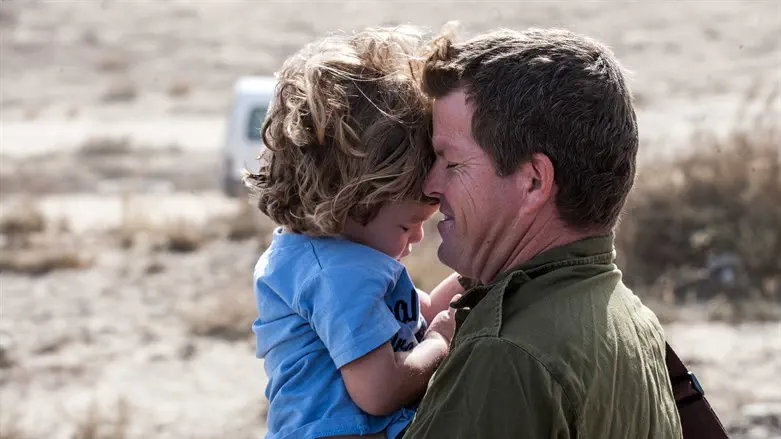
Ruthie Blum, former adviser at the office of Prime Minister Benjamin Netanyahu, is an award-winning columnist and senior contributing editor at JNS, as well as co-host, with Amb. Mark Regev, of "Israel Undiplomatic" on JNS-TV. She writes and lectures on Israeli politics and culture, and on U.S.-Israel relations. Originally from New York City, she moved to Israel in 1977 and is based in Tel Aviv.
(JNS) It’s Friday morning in Ramat Gan. A large hangar in the soccer stadium of the Tel Aviv-district city is beginning to fill up with families.
Mothers with infants in baby carriers, holding hands of toddlers; fathers pushing strollers, lugging older kids on shoulders.
The anteroom, more like a tent under the beating sun, is set up with buffets. Shawarma on a rotating spit, pita bread, salads, tahina, fried eggplant. Drinks are on the opposite wall. Bottles of cola and juice on a bar, next to vodka and beer.
One machine churns out slushies. Another spews popcorn into party bags. Cotton candy is on a constant spin.
Trays with macaroons pass around. Lollipops, jelly snakes and marshmallows occupy their own corner, as does the table laden with age-appropriate gifts for every child.
The main venue is indoors, thankfully air-conditioned. To the left are massive bouncy houses, with slides and trampolines.
To the right are stations manned by volunteers. The massage table is popular. So is the rug with beads and threads of all shapes and sizes, where little girls sit cross-legged stringing jewelry.
Most were already treated to sparkly floral face paint. It goes with their flouncy princess skirts and tiaras.
Boys play ping-pong, pool and shuffleboard with their dads. Dads in flip-flops. Half are wearing kippot on their heads and tzitzit dangling from their denim cutoffs.
Some have ponytails and piercings. All share a bond that’s immediately apparent from their mutual bear hugs.
The only thing giving away the theme of this makeshift amusement park—organized for weeks and funded by the attendees and donors—is an incessant loop of photos projected on two screens adjacent to a stage on which a live band is performing. The pictures show the above guys in full military gear: dusty helmets, ceramic vests and weapons.
These comrades-in-arms from a particular Israel Defense Forces company are in various poses, separately and together, alternately at a base in the south and in the Gaza Strip. There, they are battling Hamas. Here, they’re changing diapers. The contrast is both charming and jarring.
A master of ceremonies takes the mic, flanked by his young daughter and son. As he introduces the company commander, the men in the audience, children in their laps, burst into a chant familiar only to them. Like a secret handshake. But noisier.
“This is a different crowd from the one I’m used to addressing,” he says, referring occasionally to text he has written on his cellphone. “I’m used to talking to exhausted reservists questioning why they can’t postpone certain tasks until later, complaining, ‘We haven’t slept; we haven’t eaten.’ So, it’s moving to speak to this audience, all bright and beautiful.”
He goes on, “It’s important for me to begin by telling the women and children here, ‘Your husbands and fathers are heroes.’”
He then defines a hero as “someone who on Oct. 7 got up, left his house and headed south, putting on his gear and saying, ‘Here I am. What should I do?’”
But, he qualifies, “a hero isn’t only someone who arrived on Oct. 7; it’s someone who showed up for training in 2022, and in 2021 and in 2020 and in 2019 and in 2018 and in 2017 and in 2016. Even when it caused problems at home and at work. Even when it was hot and inconvenient. That’s what a hero is. Everyone in this company is a hero. And it was a privilege to have been called up on Oct. 7 to lead this company.”
Allowing the renewed cheering to subside, he continues: “I’m sure there are people present who’d be happy to report that I’m not an easy person. It’s true. I made life difficult for everybody in this room. But all you people did was ask what more you could do. That’s why this company earned the respect of the entire brigade.”
Turning to the wives, he says, “Now it’s time to mention the other heroes in this room—you women who took care of your households by yourselves with great strength of spirit, despite living in a state of major uncertainty. From our point of view, you fought alongside us against the enemy. Without you, we couldn’t have done any of it. And with you, we will keep winning.”
He concludes with a reminder and a request.
“There are still many challenges ahead,” he says somberly. “The fighting isn’t over. We’re preparing for the next phase of the war. So, I’m asking you to allow us to borrow your loved ones for another round.”
The battalion commander, a lieutenant colonel in a T-shirt and sandals, gets up to punctuate the speech with a similar sentiment about the importance of the home front and the inevitability of a third tour in Gaza. When he’s done, the M.C. announces that there is a Shabbat challah and bouquet of flowers waiting for everyone at the exit.
The reservists-on-furlough shuffle out, waving and slapping one another on the back. They know they’ll be summoned soon to replace their flip-flops with combat boots yet again.
These heroes of the IDF laugh as they leave the premises. I try not to let them see me crying.
